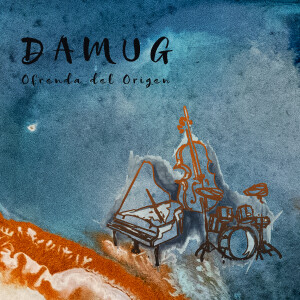 The Spanish jazz trio DAMUG’s name is an acronym created from the name of pianist, composer and leader David Muñoz Guillamon. But it’s not a one-man show: the music this trio makes is a splendid example of three-way synergy as Guillamon makes lively, accessible jazz with drummer/percussionist Martí Hosta and bassist Manolo López.
The Spanish jazz trio DAMUG’s name is an acronym created from the name of pianist, composer and leader David Muñoz Guillamon. But it’s not a one-man show: the music this trio makes is a splendid example of three-way synergy as Guillamon makes lively, accessible jazz with drummer/percussionist Martí Hosta and bassist Manolo López.
This music is redolent of the folk music in Guillamon’s home in the Catalan region of Montserrat (Barcelona), with additional influences from Cuba and from Spain’s Celtic region of Galicia. Guillamon started out as a self-taught pianist, but he has also studied composition, performance and improvization at the Taller de Músics (Barcelona) and the Instituto Superior de Arte in Havana during a two year stay in Cuba. I didn’t realize until I started preparing this review that Martí Hosta has played with two of my favorite Spanish roots acts: The now defunct Celtic band Keympa!, and the polyglot folk singer Eliseo Parra. Another alumnus of Barcelona’s Taller de Músics, he has played everything from flamenco to jazz fusion with Spanish and world music acts too numerous to mention. Likewise bassist López has played with everybody, in styles ranging from pop, rock, funk, thrash metal to jazz, folk and world music.
With all of those musical threads running through the lives of these three musicians, you’d expect that this would not be your usual jazz trio. And you’d be right. The album opens with a sensual arco bass on “Palohumano,” joined by the joyous piano melody and Hosta’s fusionistic drumming, all crisply recorded with lots of air for the parts to expand sonically. It’s immediately apparent that bassist López will have equal time with Guillamon’s piano, and that Hosta’s drumming and percussion will do more than keep the beat but will complement and comment on the melodies worked by the other two.
There’s a wonderfully complex section of interplay between piano and bass in the second track “Anaoiram,” as the two musicians somehow combine the techniques of counterpoint and improvization through much of the song, an impressive feat that speaks to the intuitive communication among the players. For a more traditional jazz feel, on “El Gallo” the melody weaves back and forth between pianoo and plucked double bass, against the backdrop of Hosta’s skittery brushed snare.
The album pivots on the title track “ODO (Ofrenda Del Origen),” which I think refers to a memorial altar for a loved family member who has died, containing pictures and mementos and representations of favorite foods, etc. The piece is a multilayered 10 minute exploration of mood and melody and rhythm that, according to the liner notes, “suggests that the possibility of believing and creating in music will depend on our senses.” I’m not sure how to interpret that, but to me it might mean being awake to the world around you, both physically and spiritually, and that’s something this music definitely represents.
Other higlights include he mixed-meter dance of “Seie Cuadros” the complementary pizzicato bass and prepared piano on “La Matrix,” the early 70s Return to Forever style fusion of “Nuevo Mundo,” and the almost straight jazz of “Soraserá” with its softly galloping rhythm, languid piano melody, and the lightly stuttering bass line that binds the two together. DAMUG’s “Ofrenda Del Origen” is jazz to make you believe in the healing power of music.
(Segell Microscopi, 2021)
